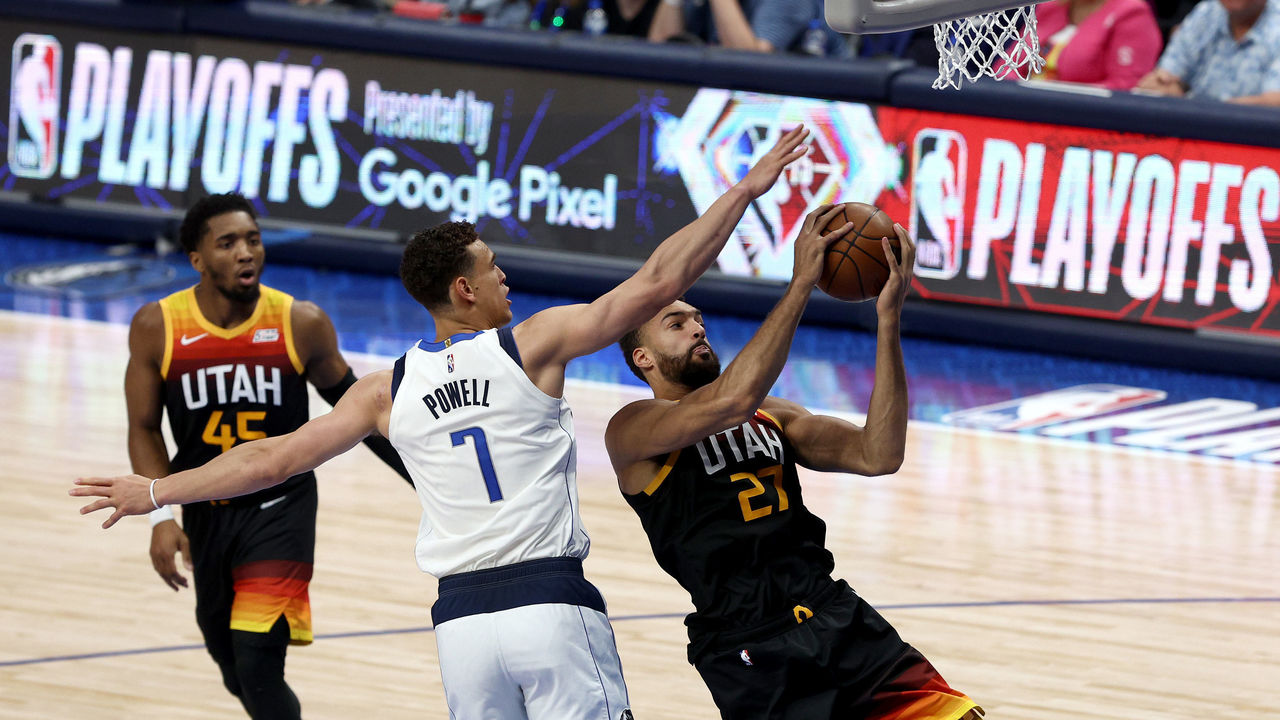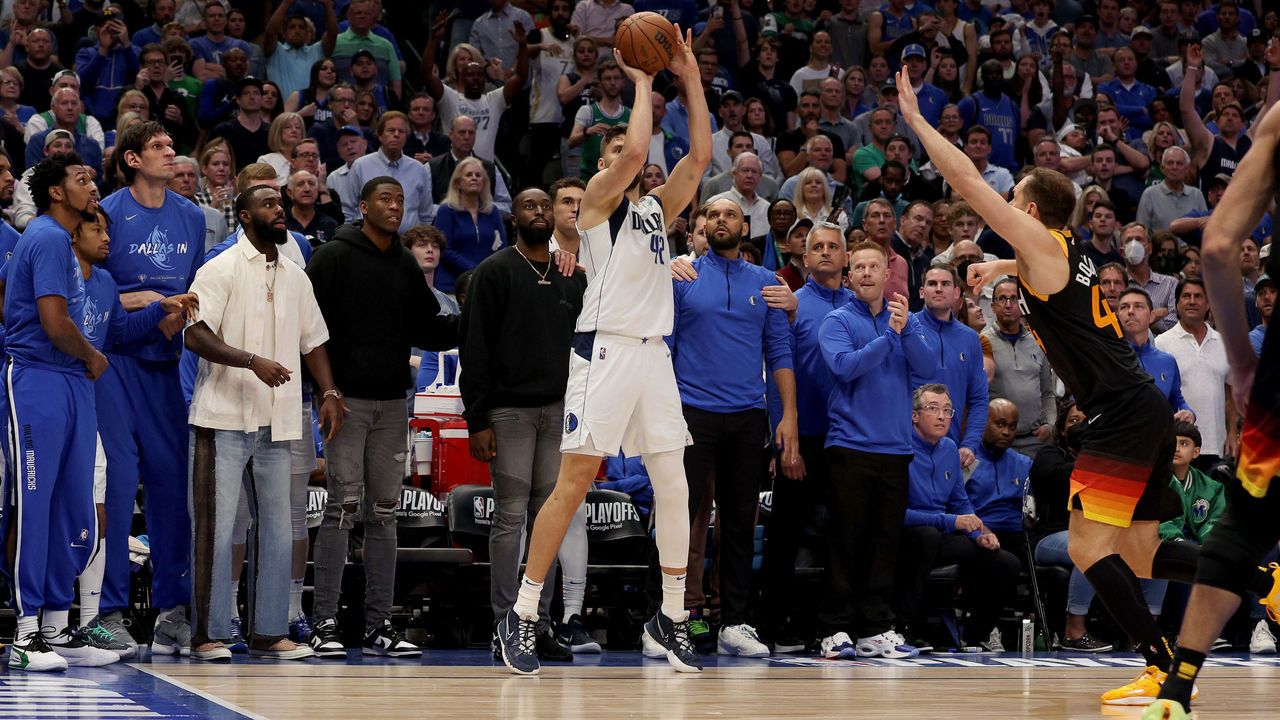Utah's Game 2 loss in Dallas looked all too familiar for Jazz fans
In almost any other playoff series, a lower-seeded team coming home after splitting two road games would be considered a success.
Leave it to the uninspiring, splintering Utah Jazz to be the rare exception to that rule.
With Dallas Mavericks superstar Luka Doncic sidelined for Games 1 and 2, a series-opening victory already in the bag, and a fourth-quarter lead to fall back on, the Jazz had no business settling for a split. Utah needed to go for the jugular.
Instead, the Jazz were undone by the same issues that have derailed the team in recent years; by the same ghosts of playoffs past.
Trust issues

For one, Utah's offense remains held back by the Rudy Gobert-sized elephant in the room.
Monday's 110-104 Game 2 loss in Dallas laid bare the ugly truths about the offensive dynamic between Gobert and his teammates. It was a sobering reminder that the Jazz don't trust Gobert enough and a demonstration of why the team has little faith in the 7-footer.
It's easy to point out plays like this as an example of why Utah ball-handlers don't feed Gobert more. But that specific possession is more evidence that the Jazz don't know their own personnel and aren't always putting Gobert in positions to succeed. Mike Conley's a veteran floor general who should know better. Who thinks posting up Gobert against Maxi Kleber is a good idea? Or a recipe for offensive success?
The big man's lack of offensive development is a topic worth discussing, but his teammates should know what he can and can't do. If Gobert has to utilize his very limited on-ball skills, even out of a post-up, it's trouble for Utah and a win for opposing defenses.
However, if you get him the ball where he can simply let his size and athleticism do the work, it's often a bucket. There's a reason why Gobert shot better than 71% from the field and took less than eight shots per game during the regular season. Throw him lobs - in all fairness, Gobert did botch multiple alley-oops in Game 2 - and recognize when your 7-foot-1 center can get you an easy basket.
Unfortunately, the Jazz still struggle with that last part. I counted three different occasions during the second half of Game 2 where Gobert either had Mavs guard Spencer Dinwiddie sealed under the basket or found himself completely alone, only for Donovan Mitchell and Bojan Bogdanovic to look elsewhere or force something for themselves.
With Utah up two and six-and-a-half minutes remaining, Mitchell had a chance to feed Gobert in transition for a potential uncontested jam. Instead, Mitchell waited a half-second too long before feeding his big man, Gobert found some traffic on the way to the hoop in the form of Kleber and Dorian Finney-Smith, and he missed what would be an easy shot at the rim for most bigs. Gobert then committed a foul trying to corral the offensive rebound.
You don't have to pick sides in this dilemma. Gobert hasn't improved his own offensive game enough, but his teammates could do a better job of spoon-feeding him. The big man's screening, rim-running, vertical gravity, and offensive rebounding are integral to Utah's top-ranked offense.
Some, like Mitchell, will use that top-ranked offense to scoff at any critiques of how he and the Jazz incorporate Gobert within that system. But that's no way for a star - or a team - with title aspirations to carry himself.
The margins between winning and losing in the playoffs are razor-thin. Even incremental improvements in an area where a team already excels can make a difference. It sure would've Monday.
Same old story for Jazz's D

Somehow, a more frustrating story for Jazz fans unfolded on the other end of the court.
As much as Gobert's perceived inability to defend in space or guard smaller lineups has been cited for why Utah's usually stout defense craters in the postseason, the real answer lies at the point of attack.
Gobert's far from a perfect big man, but he's a generational defensive talent who's too often scapegoated because he's forced to cover for the combination of inept and indifferent defenders in front of him.
Just like the undermanned Los Angeles Clippers did last spring, the Doncic-less Mavs cruised past Mitchell, an aging Conley, and Jordan Clarkson, among other Jazz perimeter players, with little resistance. Gobert constantly had to provide help, Utah's defense was put in rotation, and Dallas found the open man.
An unfathomable 17 of the Mavs' postseason franchise-record 22 made 3-pointers Monday were uncontested. Utah's defense gave up more uncontested threes than any team has surrendered in any playoff game over the last decade. Kleber alone drained eight treys, and only one was contested. Jalen Brunson erupted for 41 points on 60% shooting. A Dallas team that scored at a rate equivalent to the 25th-ranked offense with Doncic on the bench this season put up an offensive rating of 123.6 in Game 2.
With all due respect to Brunson, Kleber, and a gritty Mavs team, it was a pitiful defensive performance from the Jazz that was made more shameful by the fact they've seemingly learned nothing from the bitter playoff exits of the past.
This is now a best-of-five series where Utah holds home-court advantage. However, it feels like all that's left is for Doncic to return and put the Jazz out of their misery.
Joseph Casciaro is a senior writer for theScore.